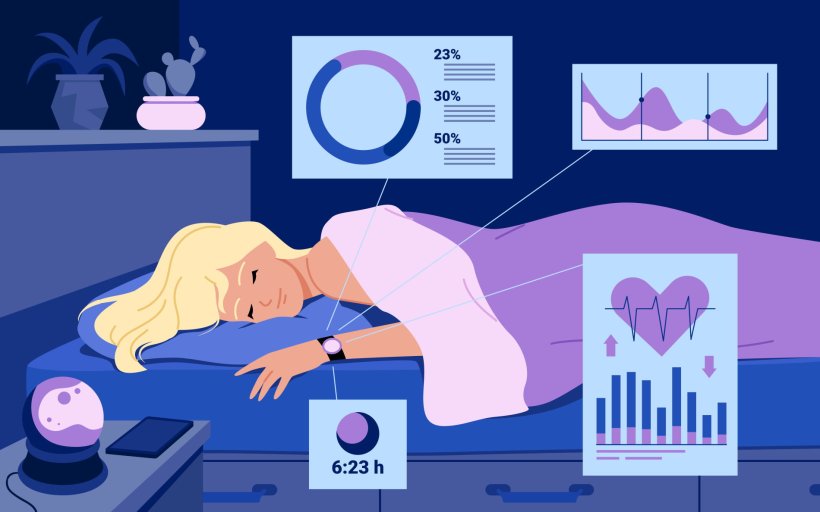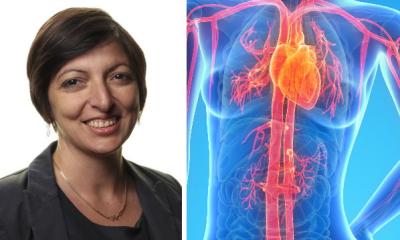
Image source: Adobe Stock/Natalia
News • Chronotype, duration, apnea and more
How sleep impacts cardiovascular health
The association between sleep disorders and cardiovascular risk is already well documented. Apnea, sleep deficit, and insomnia are linked to an increased risk of cardiovascular diseases and stroke. A new study has now explored this association in much greater depth.
Led by Inserm research director Jean-Philippe Empana and his team at the Paris Cardiovascular Research Center (Inserm/Université Paris Cité) in collaboration with the Centre hospitalier universitaire vaudois (CHUV, Lausanne), the study, published in the European Heart Journal, shows that five aspects of sleep are almost each equally important to explain the association between sleep and the risk of coronary events and stroke. Improving one of these aspects over time can bring significant benefit. These five aspects are
- nighttime sleep duration,
- chronotype (being a morning or evening person),
- frequency of insomnia,
- excessive daytime sleepiness, and
- sleep apnea.
Sleep is essential to health and well-being, and several physiological mechanisms explain this. Poor sleep quality or quantity is therefore associated with a deterioration in health: mood problems, depression, weight gain, infections, diabetes, hypertension, etc. A link has also been established with cardiovascular risk – an issue which Jean-Philippe Empana’s Inserm team at the Paris Cardiovascular Research Center decided to explore further.
To do this, the team studied the risk of cardiovascular accidents (acute coronary syndrome or stroke) in relation to the above five aspects of sleep: “Usually, studies focus on a single sleep dimension, mainly sleep duration or the presence of sleep apnea, but good or healthy sleep encompasses several dimensions,” clarifies Aboubakari Nambiema, first author of this publication and postdoctoral researcher at Inserm.
The researchers incorporated these five patterns of sleep into a single score in order to account for the multifactorial nature of sleep. Each of these patterns was evaluated using a specific questionnaire validated by the scientific community and appropriate for large studies (Pittsburgh sleep quality index-PSQI, Berlin questionnaire or Epworth Sleepiness Scale) and counts for 1 point when it is optimal and 0 points when it is not. The overall score therefore varies from 0 (worst score) to 5 (optimal score corresponding to: 7 to 8 hours of sleep per night, being a morning person, not having insomnia, apnea, or excessive daytime sleepiness).
In other words, almost 60% of incident cardiovascular disease could potentially be avoided if all individuals had an optimal sleep score (score of 5), thus highlighting the potential public health implications of the results
Jean-Philippe Empana
This score was used in two population surveys that study the determinants of cardiovascular health. One was conducted in Paris and included 10.157 adults aged 50 to 75 years (Paris Prospective Study III, PPS3) and the other in Lausanne, Switzerland, brought together 6.733 participants aged over 35 years (CoLaus|PsyCoLaus study).
The score was calculated at the point of inclusion and then two to five years later. The occurrence of cardiovascular events was then monitored for approximately eight to 10 years. “Although the use of a composite score to study sleep habits had already been tested in the past, this is the first time to our knowledge that a study has investigated its evolution over time and its potential association with cardiovascular diseases,” explains Jean-Philippe Empana.
By combining the data from the two surveys, an initial analysis confirms that the higher the initial (baseline) score, the lower the risk of incident cardiovascular disease. Compared to the participants with a score of 0-1 (10% of the participants), the risk of cardiovascular disease is reduced by 10% for those with a score of 2 (21% of the participants), by 19% for those with a score of 3 (32% or the majority of the participants), by 38% for a score of 4 (27% of the participants) and by 63% for those with the best score of 5 (10% of the participants). “In other words, almost 60% of incident cardiovascular disease could potentially be avoided if all individuals had an optimal sleep score (score of 5), thus highlighting the potential public health implications of the results,” clarifies Jean-Philippe Empana.
A second analysis that took an unprecedented look at the change in sleep score over time showed that sleep improved in 8% of the participants, deteriorated in 11% and remained stable in the majority of the participants (2/3 of them remained with a score equal to or greater than 3). Importantly, these changes are associated with the occurrence of cardiovascular disease. In particular, this risk decreased by 16% per one point increase in the score over time, regardless of which dimension of the score was improved. “They each seem to be of equal importance,” specifies Nambiema.
The researchers now hope that healthcare professionals and the general population will take advantage of this tool: “the ease and speed of use of the questionnaires as well as the simplicity of calculating the sleep score should encourage their understanding and good adherence,” they predict.
Source: Inserm
24.10.2023





